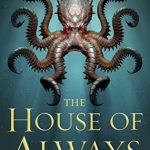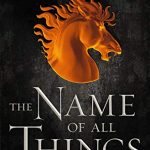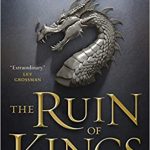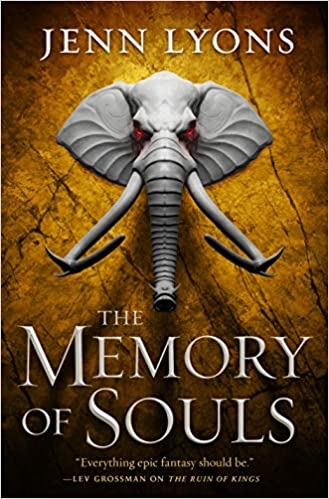 The Memory of Souls (A Chorus of Dragons, #3) by Jenn Lyons
The Memory of Souls (A Chorus of Dragons, #3) by Jenn Lyons Format: audiobook, eARC
Source: purchased from Audible, supplied by publisher via Edelweiss
Formats available: hardcover, paperback, ebook, audiobook
Genres: epic fantasy, fantasy
Series: Chorus of Dragons #3
Pages: 640
Published by Tor Books on August 25, 2020
Purchasing Info: Author's Website, Publisher's Website, Amazon, Barnes & Noble, Kobo, Bookshop.org
Goodreads
The Memory of Souls is the third epic fantasy in Jenn Lyons’ Chorus of Dragons series.
THE LONGER HE LIVESTHE MORE DANGEROUS HE BECOMES
Now that Relos Var’s plans have been revealed and demons are free to rampage across the empire, the fulfillment of the ancient prophecies—and the end of the world—is closer than ever.
To buy time for humanity, Kihrin needs to convince the king of the Manol vané to perform an ancient ritual which will strip the entire race of their immortality, but it’s a ritual which certain vané will do anything to prevent. Including assassinating the messengers.
Worse, Kihrin must come to terms with the horrifying possibility that his connection to the king of demons, Vol Karoth, is growing steadily in strength.
How can he hope to save anyone when he might turn out to be the greatest threat of them all?
My Review:
This shouldn’t work. It really, really shouldn’t. But it oh so very much does.
The Memory of Souls is the third book (out of five, dammit) in A Chorus of Dragons. With each book, the plot gets more convoluted, the politics get both more corrupt and even more twisted, the cast of characters grows almost exponentially, and things go pear-shaped so often and in so many different and competing ways that the shape has become a permanent condition.
And it all just keeps getting better and better with each installment.
The whole thing is also so inverted and convoluted and twisted and upside-down and every other direction that it should take forever to get into each new book. But it doesn’t. The minute I start, I’m instantly sucked right back in, and all the insane details come rushing right back.
At least the details I think I know. Part of the incredible charm of this series so far is that what I think I know, for that matter what the characters think they know, keeps doing handstands and kickstands and headstands.
Nothing is as it seems. Or perhaps it’s better to say that no one is as they seem. Or both. Definitely both.
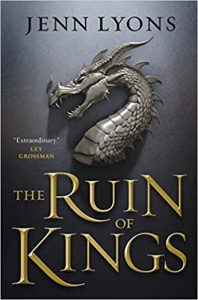 The Ruin of Kings was a sword. The Name of All Things was one of the cornerstones of this world. Following the pattern, I was expecting The Memory of Souls to be an object of some sort.
The Ruin of Kings was a sword. The Name of All Things was one of the cornerstones of this world. Following the pattern, I was expecting The Memory of Souls to be an object of some sort.
But it’s not. It’s literally the memory that souls carry with them of who they were, in ALL their previous lives. It’s as if, in the iconic Star Wars scene, instead of saying, “Luke, I am your father” Vader had said, “Luke, in my last life I was your father.” Which actually happens to one of the characters in THIS story, and it has just as much impact.
That’s a big part of the way that this entry in the series makes everything more and more and even more complex. Because all of the protagonists don’t just know who they are – for sideways definitions of “who” and “they” and “are” – but they also remember who they have been in all of their previous lives.
Every single relationship in the present is complicated by the relationships in the past. In a previous life, Teraeth and Janel were married. In that previous life, Kihrin was the son she died birthing. Although in a previous life to that one, Kihrin and Janel were lovers. In this life they’re probably going to end up as a triad, if they survive – GIGANTIC IF – and if they can manage to get past all of the crap they’re all dragging from all of the previous relationships between them.
Theirs isn’t even the most complicated. In this life, Doc is Teraeth’s father. The Goddess of Death is Teraeth’s mother. And Doc’s wife Valathea used to be Kihrin’s harp. Like I said, it’s complicated.
This is also one of those epic fantasies that I refer to as “walking like a duck and quacking like a duck but not actually being a duck.” Like Pern. A Chorus of Dragons reads like fantasy, including magic and those dragons. But the original people on this planet are all interplanetary refugees. So it’s also sorta/kinda science fiction-y.
And it absolutely has to be read in order to make any kind of sense. So you care about Kihrin and Janel and Teraeth and Thurvishar – and whether any of them are going to manage to survive the saving and destroying of the world. Because they’re probably going to be simultaneous. Or close to it. And possibly even in that order.
Unless Kihrin manages to find another way to get them all out of the mess that the beings known as the 8 Immortals, or the 8 Guardians, who are thought of as gods but definitely are not, have gotten them all into.
Whether Relos Var, who began as the villain and may still be the villain, or maybe not, is planning to save the world or end it or both. This is literally a story about the end of the world as they know it, and so far, nobody feels fine. At all. Or thinks they ever will again. In any life.
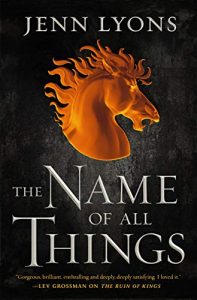 Escape Rating A++: Last year’s entry in this series, The Name of All Things, was the first time I officially gave an A++ rating. The Memory of Souls is a worthy successor. This is a rare case where an epic fantasy series seems to just keep getting better and better as it goes along – as well as getting way more complicated – while still remaining fascinating and comprehensible to anyone who has been along for the entire ride.
Escape Rating A++: Last year’s entry in this series, The Name of All Things, was the first time I officially gave an A++ rating. The Memory of Souls is a worthy successor. This is a rare case where an epic fantasy series seems to just keep getting better and better as it goes along – as well as getting way more complicated – while still remaining fascinating and comprehensible to anyone who has been along for the entire ride.
In other words, and I really can’t say this enough, you can’t start here, you have to start at the beginning – and it is so worth it.
I have the eARC of this one. I’m generally an ebook reader. But this is one story where the audiobook is vastly superior. There are several reasons for this. One is just the way that the story is being told. In this entry, Kihrin and Thurvishar are reading pieces of the story to each other, up until the very last chapter when Thurvishar is left to, let’s call it, speculate about what happened after he and Kihrin parted company.
They’re reading their own personal accounts plus every other scrap of information that Thurvishar, seemingly the official chronicler, has managed to gather. But Thurvishar is a historian and an academic, as well as, in the opinion of at least one of their sometime companions, a storyteller who can’t seem to resist making things up on entirely too many occasions. As he does at the end of this book.
Which also means that Thurvishar doesn’t just read his own parts to Kihrin, he can’t manage to stop himself from commenting on ALL of the parts, adding facts and opinions willy nilly. Something which works fantastically well in audio, and fails miserably in an ebook. Making this a rare case where my first choice would be the audio and the hardback second.
Especially considering that the readers for this entry in the series, Feodor Chin and Vikas Adam, are utterly fantastic. I just wish I was 100% certain which of them is Kihrin and which is Thurvishar. It doesn’t matter for the enjoyment of the audio, I just really, really want to know.
I finished the audio in the middle of Atlanta rush-hour traffic and just kind of sat there and stewed as I drove the rest of the way home. This series gives rise to absolutely epic book hangovers, fitting for this truly epic series.
I expect this series to just continue getting better and better. After all, The Memory of Souls is a middle-book that completely ignores that it’s a middle book, refuses to end in a slough of despond and instead leaves the reader hanging, absolutely on fire, at the edge of a cliff.
I can’t wait for book four, The House of Always, scheduled for May of 2021. Not nearly damn soon enough. Although I’m still laughing about the God of Little Houses. And you will, too.









